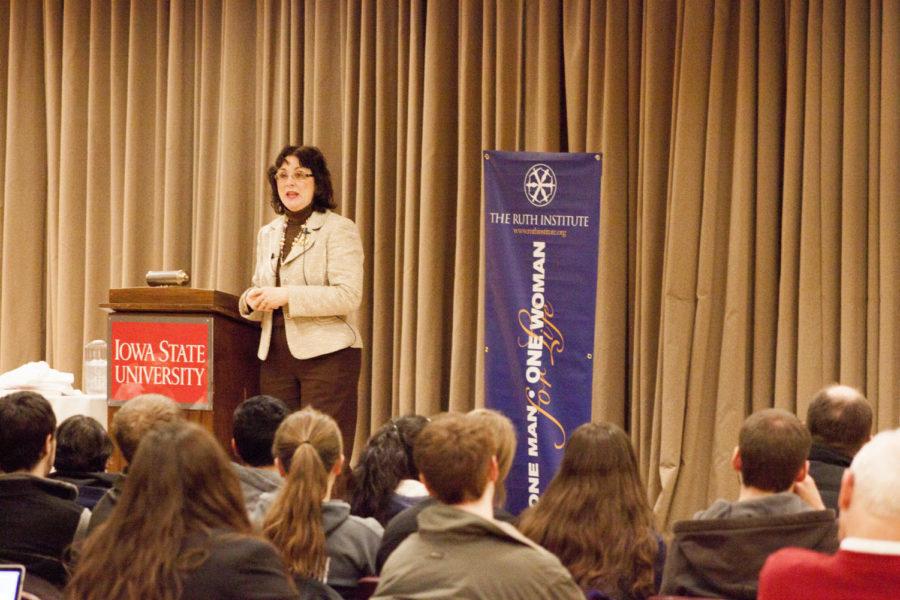Author of ‘Love and Economics: It Takes a Family to Raise a Village’ discusses importance of family in modern society
February 19, 2013
Jennifer Roback Morse, founder and president of the Ruth Institute, discussed the importance of traditional marriage and parenting on Feb. 18 in the Sun Room of the Memorial Union.
Morse started her support of traditional marriage and parenthood when she and her husband experienced trouble conceiving a child.
“My husband and I were confronted with a four-and-a-half-year infertility crisis, which for me was a whole crisis of faith, which brought me back to the practice of the Catholic Faith,” Morse said.
In 1990 Morse and her husband decided that they would adopt a child from a Romanian orphanage in order to resolve their fertility crisis. By April of 1991 they adopted a 2-1/2-year-old boy.
Ten days after the adoption Morse went to the doctor with a head cold when she found out that she was pregnant with her daughter.
Morse realized differences in her children while they were growing up. For example, when she first adopted her son, he was unable to speak any language and didn’t respond to the human voice.
Morse and her husband felt unprepared. They looked at the situation as a controlled experiment which asked the question: What difference does a mother and father have in a child’s life?
Morse enrolled her son in multiple speech therapy programs. During this she was determined to keep working while being a parent. In order to do this she kept her kids in daycare and hired a nanny. However her son could not handle a nanny or daycare.
“It became clear that he needed a mommy. He didn’t need a nanny; he needed a mommy, and that would be me and nobody but me,” Morse said.
When Morse and her family moved to California, she decided to leave her tenure at George Mason University in northern Virginia in order to focus on her children.
“It became real to me that what I was doing at my home was more significant socially than anything that I was doing in the classroom at George Mason,” Morse said.
Morse said that she believes that thousands of women undervalue their work as mothers. She believed that her work as a mother was more important because to her son and daughter she was irreplaceable. In addition, George Mason could always find another professor.
Caitie Taylor, senior in child, adult and family services, appreciated Morse’s information on different families.
“I liked how she focused on families from different lifestyles and how parent interaction impacts the children’s development,” Taylor said.
Morse explained why she believed traditional marriage and parenthood was important. One the subjects she brought up was daycare.
“There is really only one thing you need to know as a young woman planning your life. There is only one thing you need to know about daycare. The one thing you need to know is not all children will do well in daycare,” Morse said.
Morse explained that some studies show that daycare causes an elevated risk of detachment issues, particularly in boys. She said that families should not put themselves in situation where they plan their life around daycare because it may not be right for their child.
“The stability of the union of the mother and father is extremely important to the child, quite apart from whether mom and dad are happy,” Morse said.
While researching for her book, “Love and Economics: It Takes a Family to Raise a Village,” she looked into the impact of divorce and unwed parenthood on children.
One study that Morse referenced determined whether or not divorce is bad thing for children. This study split marriages into two classes: high-conflict marriage and low-conflict marriage.
High-conflict marriages involves things such as drug and domestic abuse while low-conflict marriage involves an unsatisfying marriage.
This study found that if a household had a high-conflict marriage, divorce was the better option for the child, but if the household had a low-conflict marriage, divorce would be more damaging for the child.
“The idea that there are no limits on what people can do in their family, and the idea that adults can do whatever they want and somehow it’s going to work, that is an idea we need to surrender,” Morse said. “There actually is more freedom in the commitment of mother and father to one another and their children.”







